All products featured are independently chosen by us. However, SoundGuys may receive a commission on orders placed through its retail links. See our ethics statement.
Bose QuietComfort Ultra Headphones vs Bose QuietComfort 45
April 29, 2025
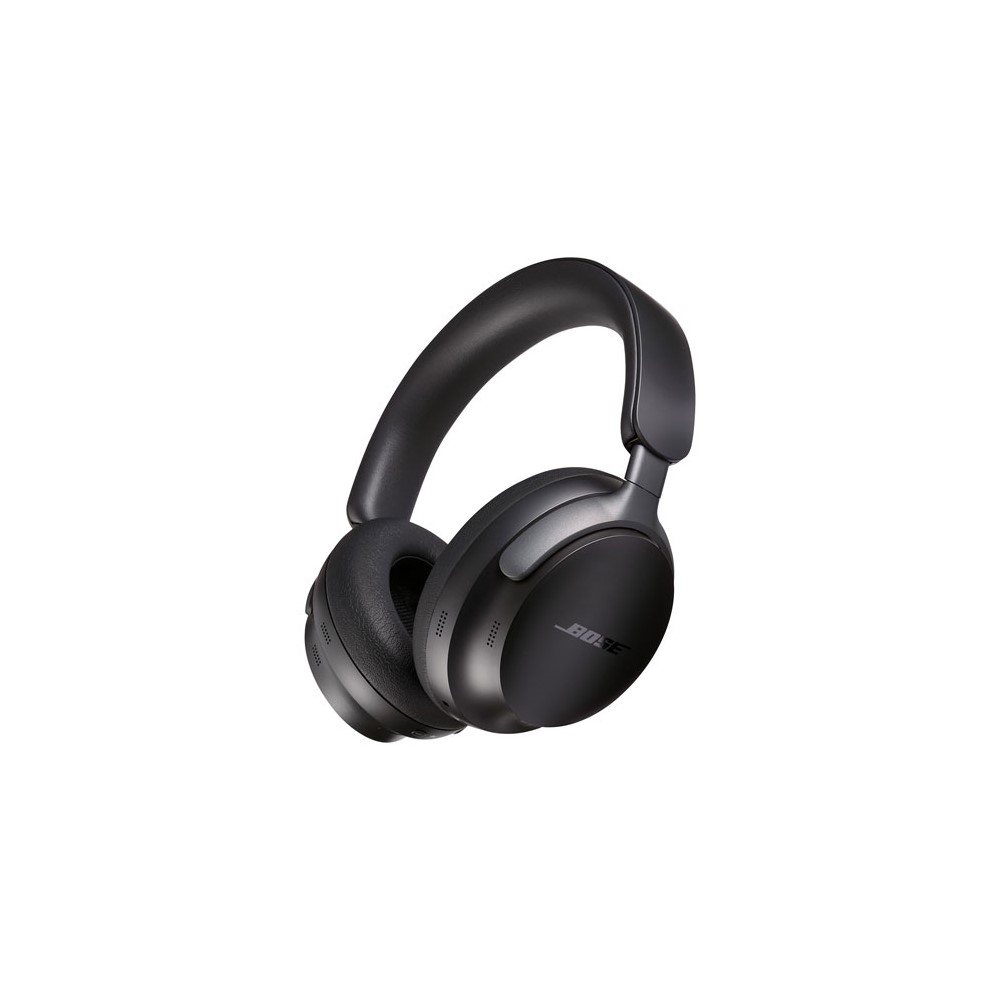

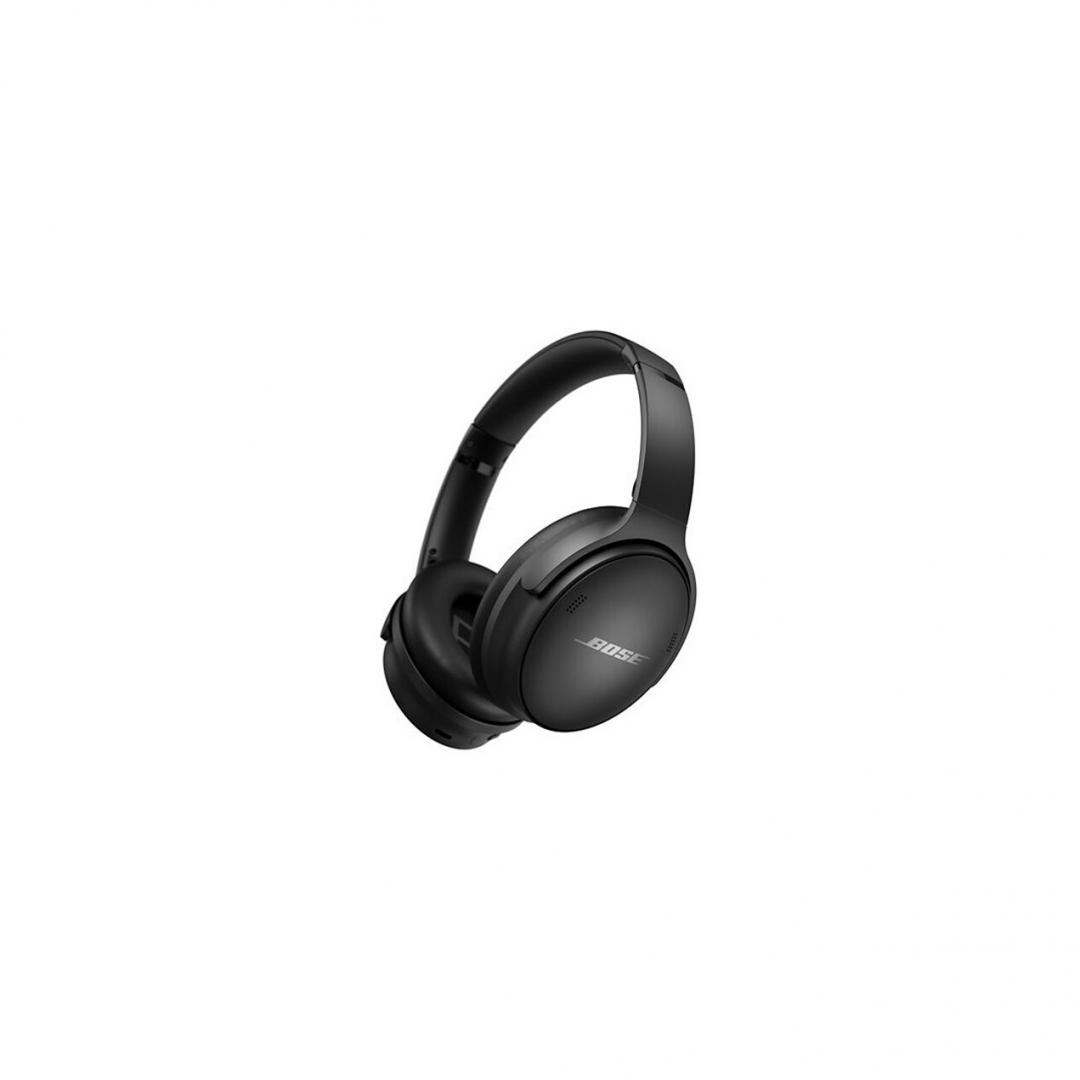

We’ve all seen our share of Ultra, Pro, and Max naming schemes in recent years. Similarly, a bigger number in a name has usually meant it was better or newer. So, when pinning the Bose QuietComfort Ultra Headphones against the Bose QuietComfort 45, what’s in a name? We stack the latest tech-packed Bose active noise canceling (ANC) headphones against their slightly older siblings. Let’s see what a couple of years apart means for these headphones and their performance.
- This article was updated on April 29, 2025, to update measurement data.
- This article was updated on April 8, 2025, to correct minor errors, update information.
- This article was updated on October 8, 2024, to update formatting.
- This article was published on November 24, 2023.
What’s it like to use the Bose QuietComfort Ultra Headphones compared to the Bose QuietComfort 45?
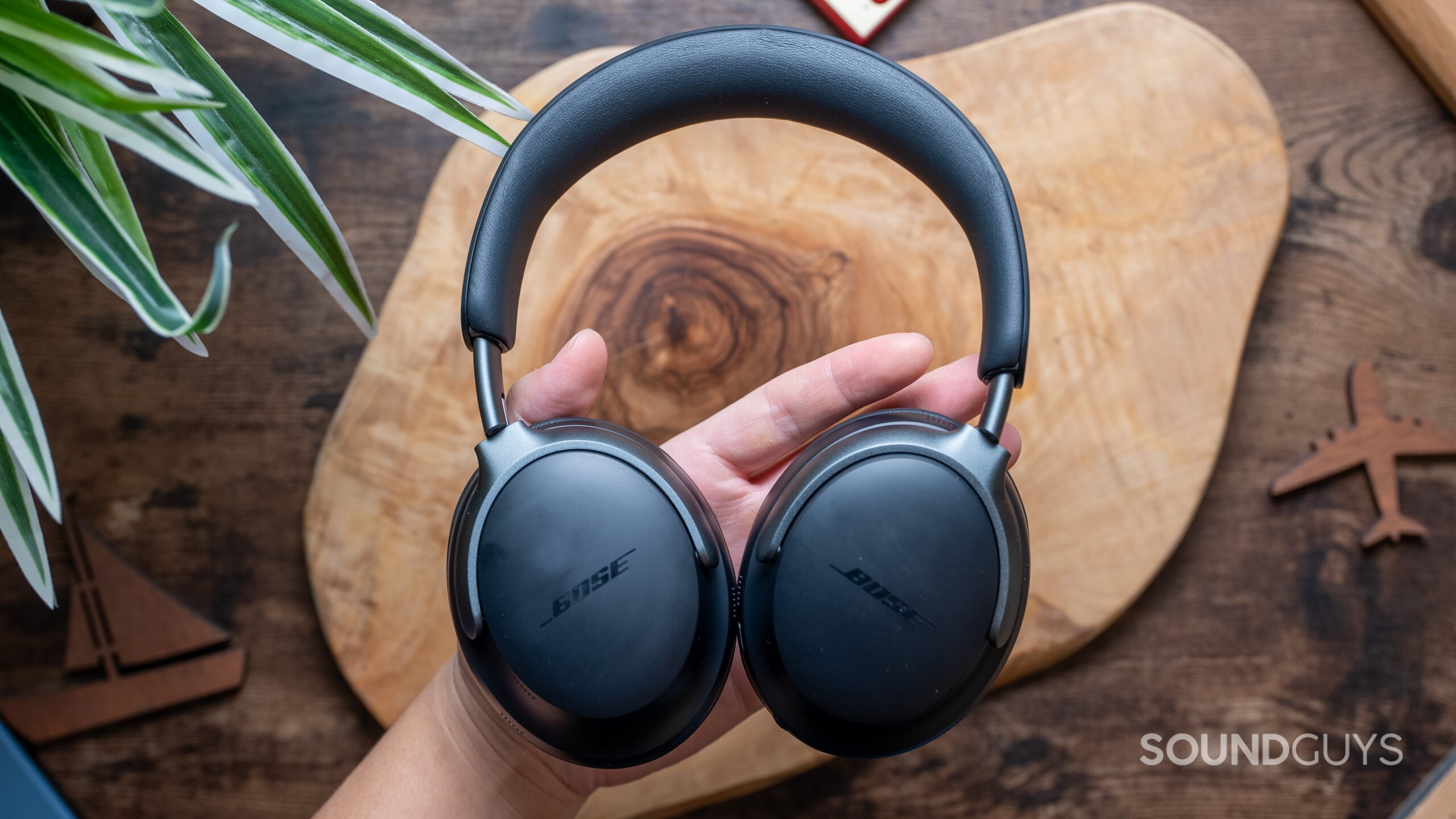
Cruising at lean 253 g, the Bose QuietComfort Ultra Headphones live up to the promise of comfort, which is a good start for the newest flagship. Replete with cushioning and relatively accommodating ear cups, the Ultra ought to fit most heads. The understated aesthetics don’t call attention but don’t look cheap either, and the headphones fold down with articulating ear cups for portability.
Included with the QuietComfort Ultra Headphones are a case for easy travel, and a 2.5mm to 3.5mm cable for wired listening in addition to wireless listening. Also, the QuietComfort Ultra use physical buttons along the sides of the ear cups, rather than touch controls often found on high-end headphones or Bose’s own Noise Cancelling Headphones 700.
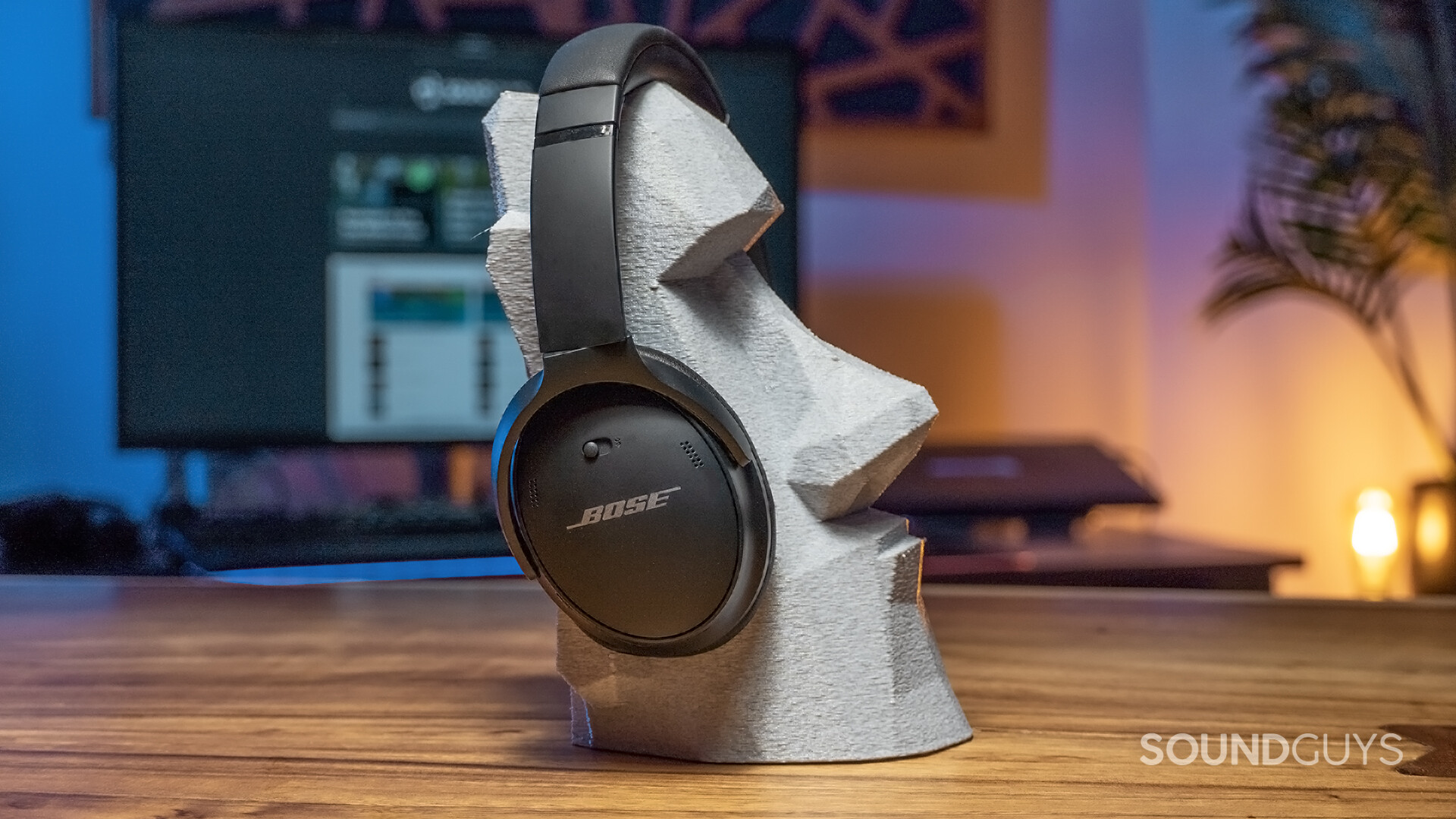
In looks, the Bose QuietComfort 45 do not appear too different from the QuietComfort Ultra Headphones — perhaps less generous padding along the crown, but they feel good anyway. They retain similar subdued design cues with physical buttons for controls and optional wired/wireless listening. The QuietComfort 45 can fold down as well. Plus, the lineage is clear as the QuietComfort 45 wear easily for long periods of time. Even the weight of 240 g gets quite close to the QuietComfort Ultra. Otherwise, these have vents on the flat of the ear cups, which are noticeable but not super notable. Still, these two are not the same headphones, but the greatest differences are not found in their fits or accessories, but in every other facet.
How do you control the Bose QuietComfort Ultra Headphones and Bose QuietComfort 45?
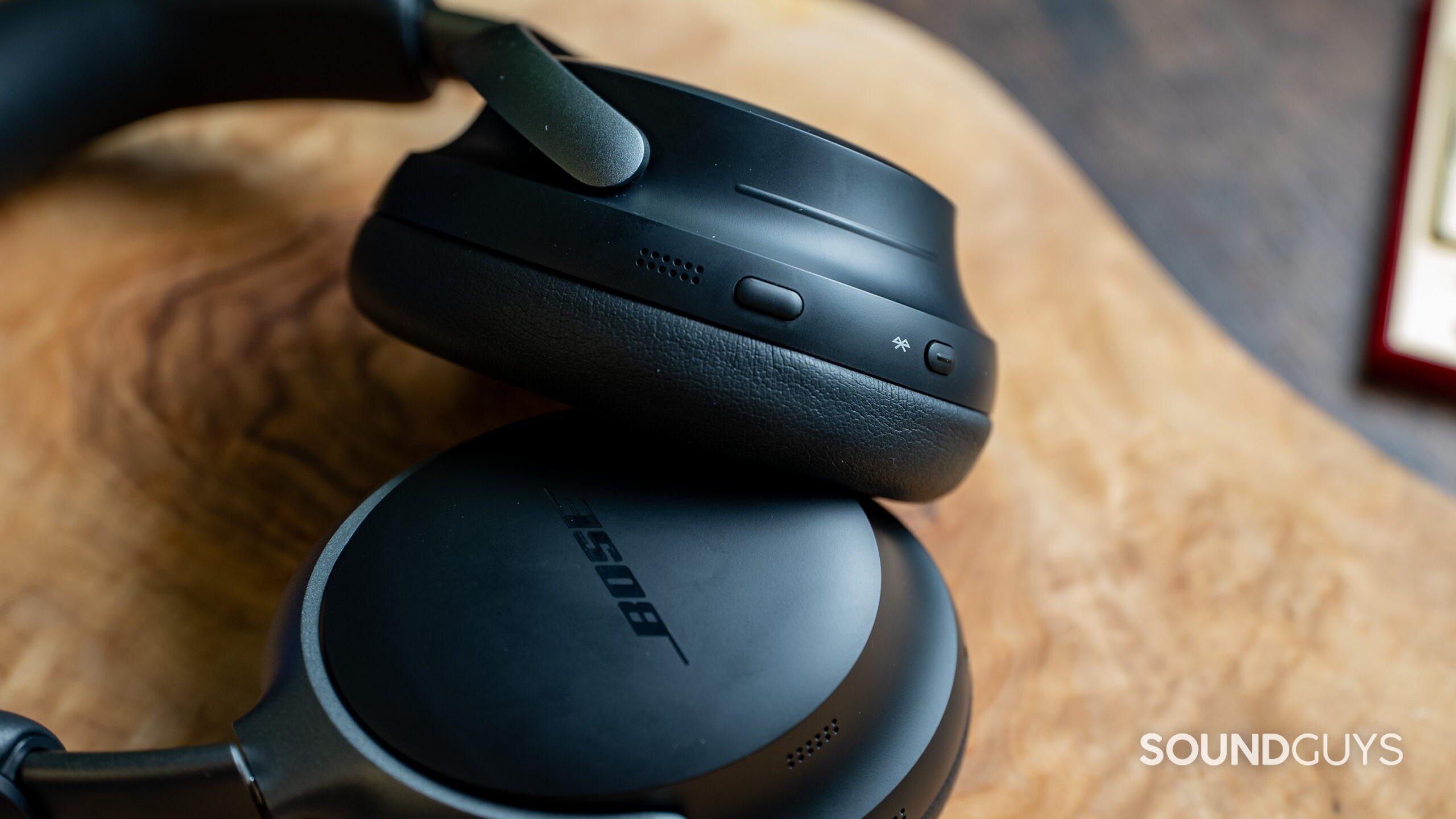
Most of the controls for the Bose headphones are baked in. Both headphones have multi-function buttons, which is how you can customize the controls using the app. Unlike the QuietComfort 45, the Ultra version uses a volume strip that you swipe. Take a gander at the table for the QuietComfort Ultra Headphones controls.
| Action | Multi-function button | Bluetooth / Power button | Volume strip |
|---|---|---|---|
| Action Single tap | Multi-function button Play / pause | Bluetooth / Power button Battery level check | Volume strip N/A |
| Action Double tap | Multi-function button Track forward | Bluetooth / Power button N/A | Volume strip N/A |
| Action Triple tap | Multi-function button Track backward | Bluetooth / Power button N/A | Volume strip N/A |
| Action Long press | Multi-function button ANC mode change | Bluetooth / Power button On / off | Volume strip Shortcut (define in app) |
| Action Swipe | Multi-function button N/A | Bluetooth / Power button N/A | Volume strip Volume up / down |
The QuietComfort 45 is similarly straightforward, with dedicated buttons for most commands and a multi-function button. Here are the controls for the Bose QuietComfort 45.
| ACTION | TOP BUTTON (right) | MIDDLE BUTTON (right) | BOTTOM BUTTON (right) | ACTION BUTTON (left) |
|---|---|---|---|---|
| ACTION One press | TOP BUTTON (right) Volume up | MIDDLE BUTTON (right) Play/pause, answer/end call | BOTTOM BUTTON (right) Volume down | ACTION BUTTON (left) Toggle ANC mode |
| ACTION Two presses | TOP BUTTON (right) | MIDDLE BUTTON (right) Next track | BOTTOM BUTTON (right) | ACTION BUTTON (left) Mute call |
| ACTION Three presses | TOP BUTTON (right) | MIDDLE BUTTON (right) Previous track | BOTTOM BUTTON (right) | ACTION BUTTON (left) N/A |
| ACTION Press and hold | TOP BUTTON (right) | MIDDLE BUTTON (right) Decline call | BOTTOM BUTTON (right) | ACTION BUTTON (left) Voice assistant |
Should you use the apps of either Bose QuietComfort Ultra Headphones or Bose QuietComfort 45?
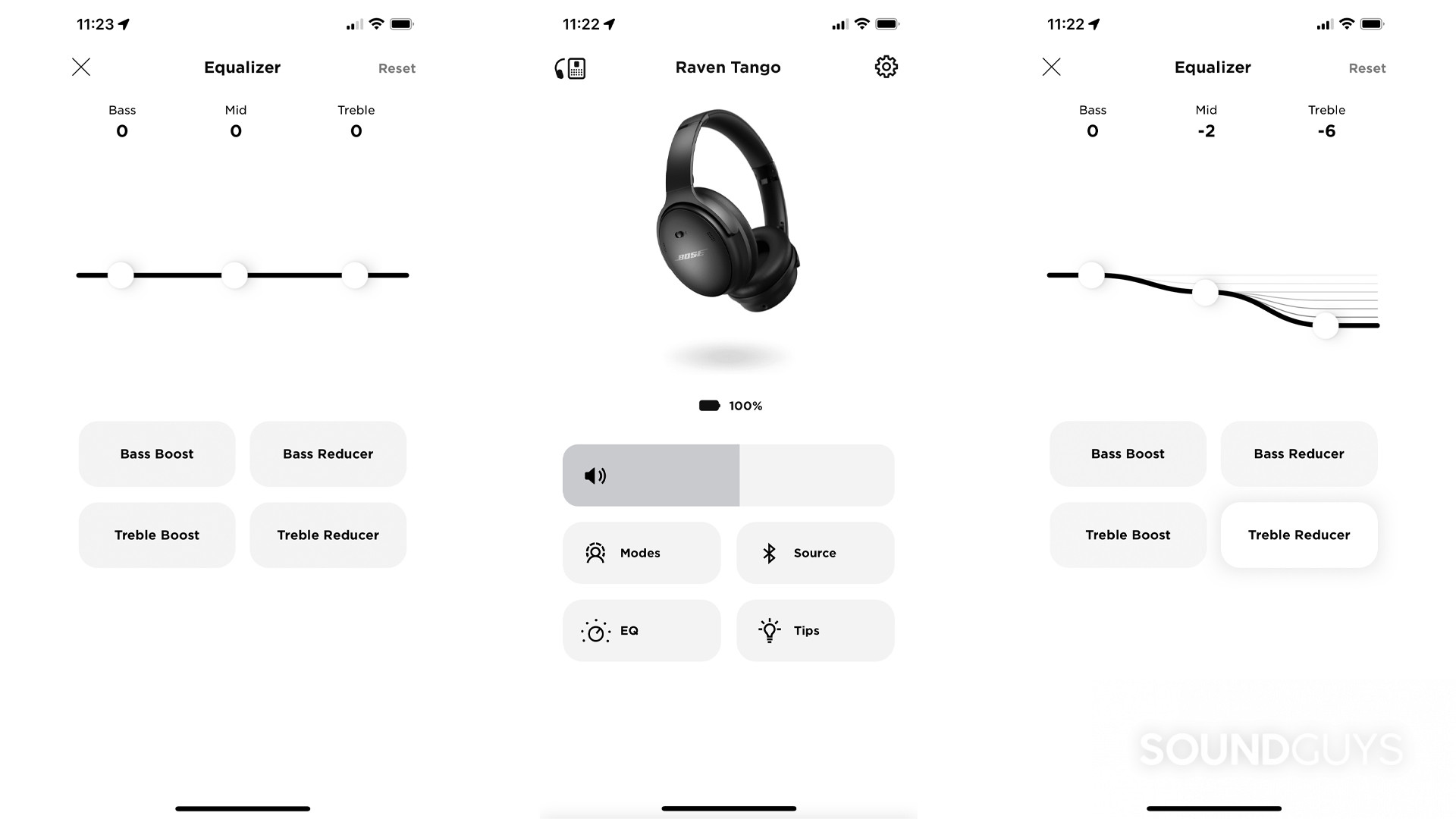
Bose Music (iOS/Android) is the app you need with both the QuietComfort Ultra and QuietComfort 45. It demands a lot of your data, and in exchange, you gain access to updates, an equalizer, listening mode controls, immersive audio, and some command remapping. Bose tends to supply significant updates to features, so you’ll most likely want to get the app.
The equalizer is pretty rudimentary, but for the QuietComfort 45 you can get the tuning really close to our preferred frequency response (more on that later). Tinkers, however, might find the features a bit light.
How do the Bose QuietComfort Ultra Headphones and Bose QuietComfort 45 connect?
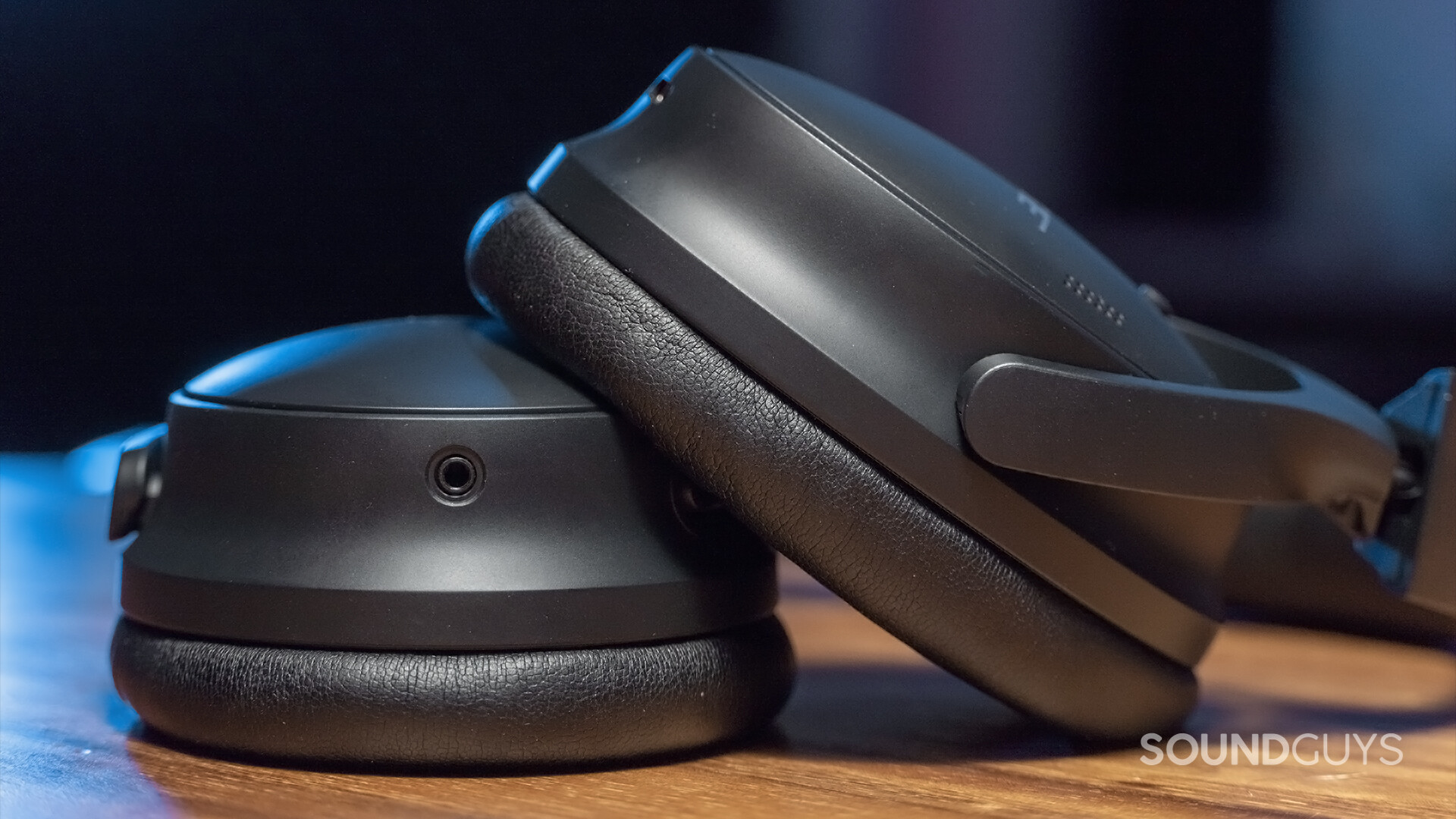
Of the defining features found on the Bose QuietComfort Ultra Headphones, the upgrade to Bluetooth 5.3 is a nice one. More exciting, however, is the addition of Snapdragon Sound, which may (or most likely not) apply to your current rig, as the feature works solely with Android devices using Qualcomm Snapdragon 888 or newer. Unfortunately, Qualcomm’s XPAN Wi-Fi feature isn’t in the suite but rather aptX Lossless. Qualcomm claims that you can access CD quality with this high-bitrate codec.
For the uninitiated Android users and Apple users, you get the less exotic AAC and SBC Bluetooth codecs. The QuietComfort 45 use the same AAC and SBC codecs over the older Bluetooth 5.1, meaning you won’t get LE Audio down the line with these. Besides that, you don’t get USB-C listening with either headphones, and both include a 2.5mm to 3.5mm TRS cable to plug in.
Is battery life better on the Bose QuietComfort Ultra Headphones or Bose QuietComfort 45?
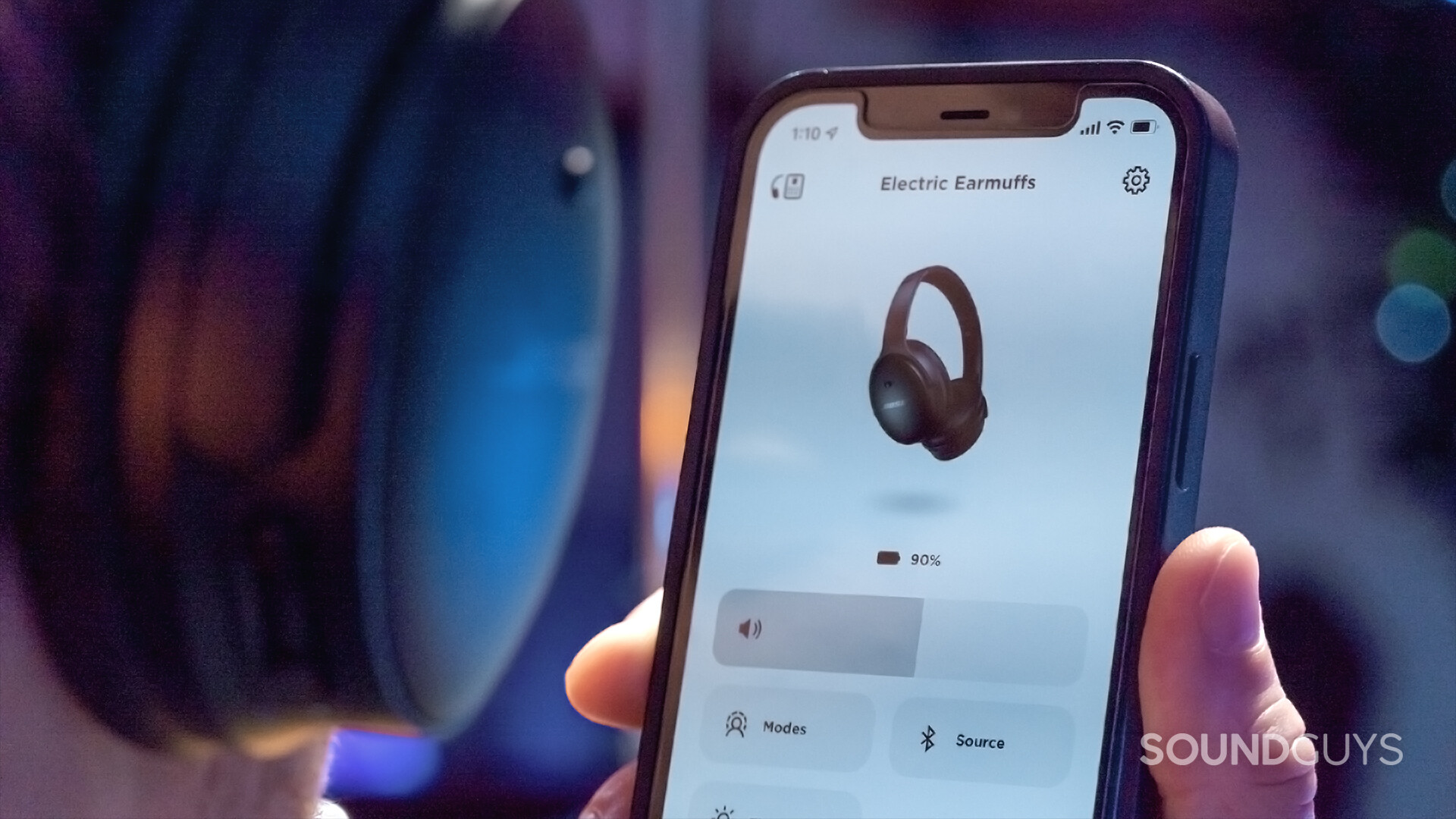
To directly compare the Bose QuietComfort Ultra Headphones and the Bose QuietComfort 45 we use the same battery test methodology. The QuietComfort Ultra Headphones reach 27 hours and 37 minutes. You get 24 hours and 49 minutes of battery life from the Bose QuietComfort 45, which is a respectable time. Both headphones will outlast most weekly commutes and certainly make sense on a flight.
Do the Bose QuietComfort Ultra Headphones or Bose QuietComfort 45 block noise better?
Loading chart ...
Bose has been at the forefront of active noise canceling since the early days, so it comes as no surprise that both headphones are great candidates. Essentially across the board, the Bose QuietComfort Ultra cancels or isolates more noise than the older QuietComfort 45. In addition to averaging one-upping the QuietComfort 45 by about 10dB more noise filtering, the Ultra also blocks up to a whopping 50dB of high pitched sounds.
The QuietComfort 45 is no slouch either, comprehensively filtering noise up to 30dB, although usually hovering between 20dB and 30dB where it counts. These can’t quite outdo the Ultras, but they’re still excellent by most measures.
Loading chart ...
Both headphones are laudable for their consistent and comprehensive treatment of noise, whereas some manufacturers don’t implement especially consistent ANC systems, leaving some environmental noise to reach your ears sounding unnatural. Avoiding noise-induced hearing loss rates as one of the main reasons to pick up either set of cans because you can keep your volume low and not compete with the external world wherever you are.
Do the Bose QuietComfort Ultra Headphones sound better than the Bose QuietComfort 45?
On the whole, we liked the Bose QuietComfort Ultra Headphones a little bit more than the Bose QuietComfort 45. However, make sure you turn the headphones on after putting them on, as the CustomTune equalization makes a world of difference.
Objective measurements
Loading chart ...
Compared to our headphone preference curve, the Bose QuietComfort Ultra does a pretty good job. The tuning gets pretty close to our preference. On the opposite end of the spectrum, the QuietComfort 45 sound follows our preference curve pretty tightly except in the highs, where there’s too much. Fortunately, the rudimentary equalizer can adjust the trebly voicing of the QuietComfort 45 rather easily. For those who prefer bass-dominant tuning, the QuietComfort Ultra Headphones deliver that by default.
Adding to the difficulty in assessing which is better, the CustomTune feature measures and adjusts the sound to accommodate your unique anatomy, and it’s available on both headphones. Similarly, both have the immersive audio feature, which can be characterized as moving the stereo sound in front of you like a stage with speakers, and if you move, it shifts relative to your position. It just becomes a matter of whether you want to EQ your headphones much or not at all.
Do the Bose QuietComfort Ultra Headphones or Bose QuietComfort 45 have a better microphone?
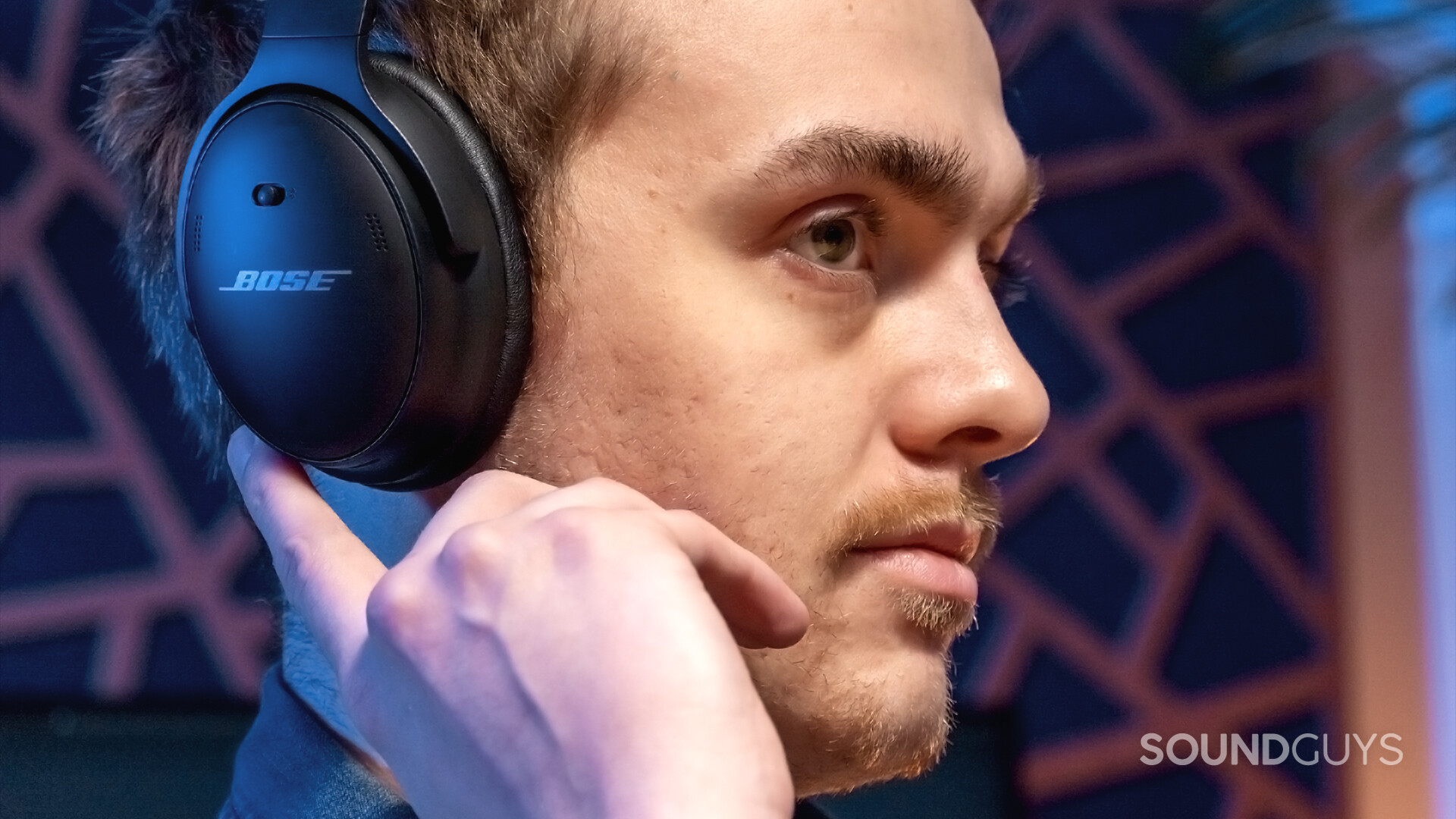
The microphone systems on the QuietComfort Ultra Headphones and the QuietComfort 45 are rather good for most applications like work calls. Particularly notable is the wind rejection on the QuietComfort 45, which sounds nearly as good as in ideal conditions. The QuietComfort Ultra Headphones also do a good job of balancing capturing your speech and filtering out noise in our demos. It seems like a pretty close call, so tell us what you think below.
Bose QuietComfort Ultra Headphones microphone demo (Ideal conditions):
Bose QuietComfort 45 microphone demo (Ideal conditions):
Bose QuietComfort Ultra Headphones microphone demo (Office conditions):
Bose QuietComfort 45 microphone demo (Office conditions):
Bose QuietComfort Ultra Headphones microphone demo (Street conditions):
Bose QuietComfort 45 microphone demo (Street conditions):
Bose QuietComfort Ultra Headphones microphone demo (Windy conditions):
Bose QuietComfort 45 microphone demo (Windy conditions):
Bose QuietComfort Ultra Headphones microphone demo (Reverb conditions):
Bose QuietComfort 45 microphone demo (Reverb conditions):
Which microphone sounds best to you?
Bose QuietComfort Ultra Headphones vs Bose QuietComfort 45: Price and availability
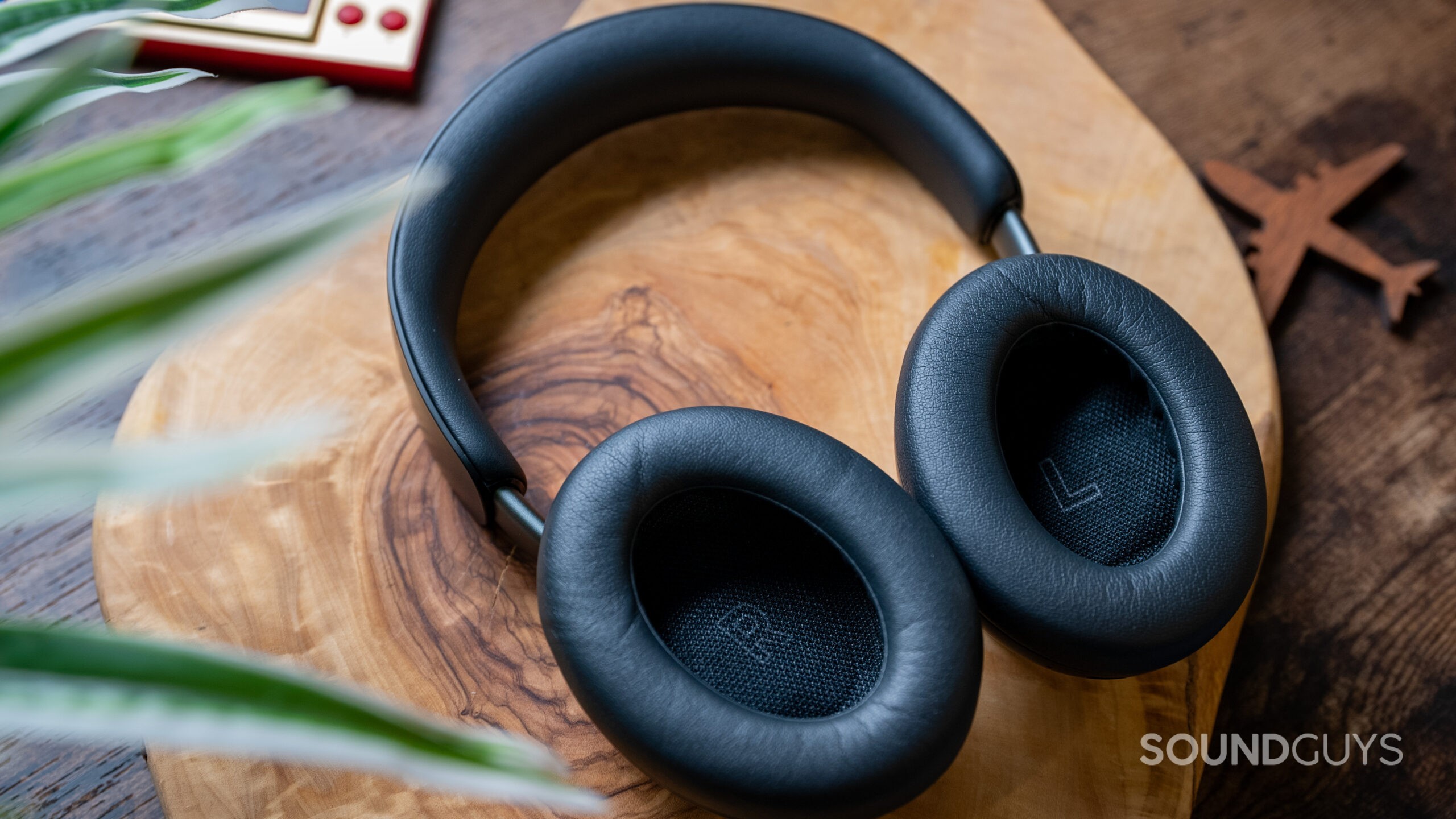
Here’s the clincher, the Bose QuietComfort Ultra Headphones sell for $429, which isn’t pennies. For about $100 less, you can pick up the Bose QuietComfort 45 at $329. By virtue of being the older model, the QuietComfort 45 typically can be found for an even lower price.
Should you get the Bose QuietComfort Ultra Headphones or Bose QuietComfort 45?
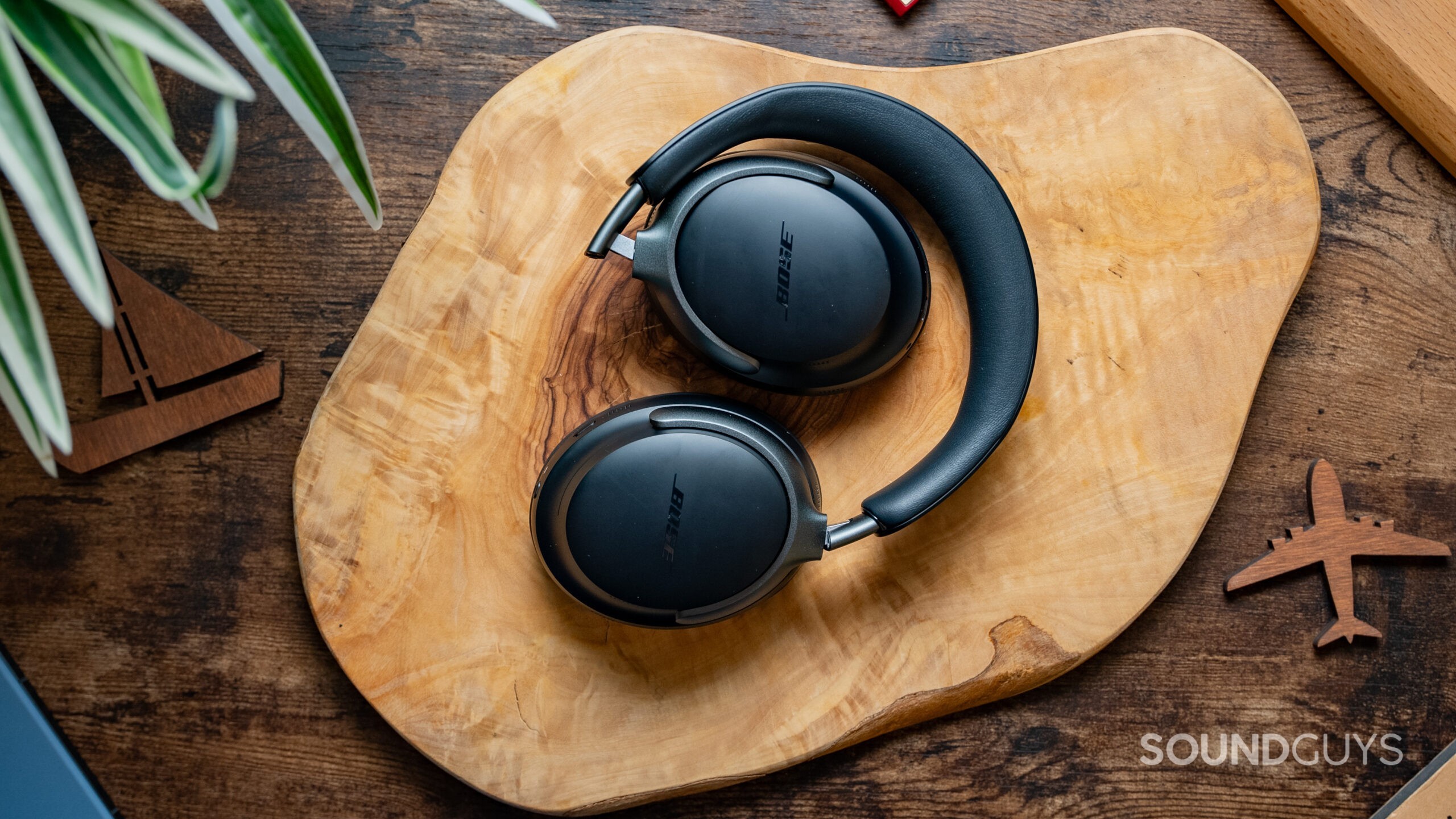
In a universe where money is no object, the Bose QuietComfort Ultra Headphones consistently outperform the Bose QuietComfort 45, and therefore, that’s the set to buy. Keep in mind, though, that while the QuietComfort Ultra have improved noise canceling, greater connectivity, and a slightly longer battery life, these are incremental and not earth-shattering upgrades. The QuietComfort 45 remain a solid, comfortable, and all-around competently executed set of headphones, and if you can’t stretch the budget for the flagship, these are still good.
With that said, let the cash flow if you can, because the Bose QuietComfort Ultra Headphones really do feel good, work well, and have greater futureproofing with the upgraded connectivity.

Advanced audio experience
Frequently asked questions
Neither headphones come with an ingress protection (IP) rating against sweat (or dust, for that matter). So you’re best off avoiding gyms with the QuietComfort Ultra Headphones and QuietComfort 45.
Immersive audio mode shifts your stereo image so that the sound is coming from in front of you. This mode also has head-tracking, so if you move, the area the sound is coming from stays locked while you essentially hear the audio piping in from different angles. Alternatively, you can turn this off, and the effect won’t change depending on your location.
| Mode | What it does |
|---|---|
Motion | Uses head tracking data to keep imaginary speakers at the same position relative to you. |
Still | Keeps the imaginary speakers in front of you no matter how you turn your head. |
Off | No spatialization applied. |
The audio quality declines a bit, as shown below, for the QuietComfort Ultra Headphones.
Loading chart ...
In all, spatial audio (or immersive audio, depending on who’s talking) still has some ways to go, as sometimes the channel balance being off can diminish the effectiveness of surround sound.
Thank you for being part of our community. Read our Comment Policy before posting.